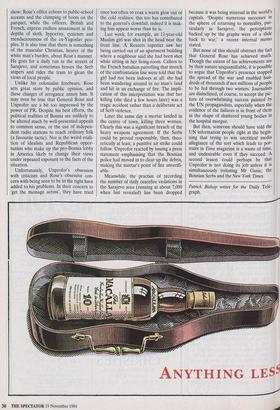BUILT UP AND KNOCKED DOWN
Patrick Bishop tracks the rollercoaster
ride of General Sir Michael Rose's reputation
Sarajevo SOON AFTER the Bosnian Serbs backed down in the face of threatened Nato air attacks last February, agreeing to with- draw their heavy weapons from around Sarajevo, President Clinton went out of his way to praise the man who had negotiated the deal. Lt-Gen. Sir Michael Rose had recently arrived as the UN force comman- der in Bosnia and shown an 'aggressive attitude', Mr Clinton declared approving- ly: the British general was 'making a real difference'.
The presidential endorsement was another coat of paint in the rapid gilding job then being done to Rose's transatlantic reputation. He was, gushed the Washington Post, a 'Central Casting version of the high- born British military commander'. A spe- cially commissioned Time magazine portrait showed the general, dove in hand, staring enigmatically from the canvas, while F-15s streaked across the sky behind him, and more praise followed.
But they are not long, the days of wine and roses, especially where journalists are concerned. General Rose himself under- stood the cyclical nature of modern fame. 'It's build 'em up to knock 'em down,' he would remark fatalistically, as he chatted in the evenings with reporters at his head- quarters in the Residency, an old Tito man- sion in the middle of Sarajevo.
And so it has been: it was not long before the press turned on their old hero. Veteran liberal hand-wringers like Antho- ny Lewis of the New York Times (who has never set foot in Sarajevo) now denounce Rose as an appeaser and stooge of the Serbs. The London Times earlier this month wrote a critical editorial that stung the general to fire back a letter of reproach. Meanwhile, diplomats complain of his limp-wristed' approach in the appli- cation of Nato air power. Inside the Unit- ed Nations Protection Force (Unprofor) itself, information officials, who are paid to bang the drum for the general, jibe at him behind his back.
As for the Bosnian government, Rose is scarcely less of a hate figure to them than is General Ratko Mladic, the suitably brutish-looking enemy commander. In ten months then, Sir Michael's reputation, in American and Bosnian eyes at least, has sunk from preux chevalier to Eurowimp.
How has this happened? To a large extent this is a story of disappointed expectations. Both the interventionist lobby in Washington and the Bosnian gov- ernment, still stubbornly hoping the UN could be dragged in on their side, believed at first that Rose's appointment worked to their advantage: Rose's own pre-publicity gave them these hopes. Sarajevo politi- cians and the advocates of tougher action against the Serbs looked at his long career in the SAS, heard tales of his liberal instincts and deduced that here was the perfect 'tough but tender' soldier needed to tackle the task of peace-keeping in Bosnia. Tough with the Serbs, that is; ten- der with the Bosnians. Their optimism seemed justified when he promised a new, more robust approach in dealing with the insolence of the Bosnian Serb army. Within a week of arriving he forced the Serbs to dismantle a roadblock barring the way to Sarajevo by threatening to dispatch Warrior armoured vehicles to blast their way through. The problem then seemed how to restrain Rose, not how spur him to action.
This misconception did not last long. It soon became clear that Rose well under- stood the restraints he was operating under, and would stick firmly to the Euro- pean — minimalist — interpretation of how the UN mandate in Bosnia was to be interpreted. He showed a strong reluctance to antagonise the Serbs after they complied with the agreement to withdraw heavy weapons from around Sarajevo, for exam- ple, and when the Serbs attacked the Mus- lim enclave of Gorazde in eastern Bosnia in April, Unprofor first played down the scale of the assault, and then showed the greatest unwillingness to use the Nato air- power at their disposal to deter it. Since then Rose has opposed anything but the most symbolic use of force against Serb transgressions. At the same time — to the Bosnian government's outrage — he has threatened air strikes against their soldiers for breaches of agreements.
Anyone who spends a few hours reflect- ing on Unprofor's situation in Bosnia can see the thinking behind Rose's caution. Unprofor is armed and organised as a peace-keeping, not a peace-making, opera- tion. Rose is there to nurture whatever calm exists, and where possible to extend it. Practically speaking, that means taking care not to tread on Serb toes: air strikes, no
matter how satisfying, are only going to provoke them, widen the war and put his men in danger.
At the same time, any offensive opera- tions by Bosnian government forces, such as those of the last few weeks, are equally unwelcome. Yes, Unprofor agrees, there is a possibility that setbacks on the battlefield will persuade the Serbs to return to the negotiating table. More likely, however, they will decide to exert pressure on the Bosnian government by resuming the bom- bardment of Sarajevo. The Bosnian gov- ernment understands the argument, though of course it does not agree with it, as do the journalists who are routinely crit- ical of the UN. Mutual comprehension has done nothing to improve relations.
`I had high hopes of him at the begin- ning,' Ejup Ganic told me recently. Ganic, the drawling, cashmere-coated Bosnian vice-president who has denounced Rose as an enemy of the Bosnian people, felt he had been deceived: We thought, "They can't fool this guy. He will never allow his convoys to be stopped or his soldiers to be kicked around", yet it is happening every day.'
It is true that there are legitimate criti- cisms of Rose. His manner is often said to be high-handed and colonialist; it is cer- tainly true that an air of 19th-century India hangs over Rose's operation. All Unpro- for's olive-branch and dove imagery cannot dispel the impression that privately they feel that they ought to be running the show: Rose's office echoes to public-school accents and the clumping of boots on the parquet, while the officers, British and French, express endless amazement at the depths of sloth, hypocrisy, cynicism and mendaciousness of the ex-Yugoslav peo- ples. It is also true that there is something of the muscular Christian, bearer of the white man's burden, about Rose's manner. He goes for a daily run in the streets of Sarajevo, and sometimes braves the Serb snipers and rides the tram to glean the views of local people.
Unlike his colonialist forebears, Rose sets great store by public opinion, and these charges of arrogance annoy him. It may even be true that General Rose and Unprofor are a bit too impressed by the power of PR. Despite his best efforts, the political realities of Bosnia are unlikely to be altered much by well-presented appeals to common sense, or the use of indepen- dent radio stations to reach ordinary folk (a favourite tactic). Nor is the weird coali- tion of idealists and Republican oppor- tunists who make up the pro-Bosnia lobby in America likely to change their views under repeated exposure to the facts of the situation.
Unfortunately, Unprofor's obsession with criticism and Rose's obsessive con- cern with being seen to be in the right have added to his problems. In their concern to `get the message across', they have tried once too often to coax a warm glow out of the cold realities: this too has contributed to the general's downfall, indeed it is mak- ing him appear worse than he is.
Last week, for example, an 11-year-old Muslim girl was shot in the head near the front line. A Reuters reporter saw her being carried out of an apartment building where a neighbour said she had been shot while sitting in her living-room. Callers to the French battalion patrolling that stretch of the confrontation line were told that the girl had not been indoors at all: she had been wandering around in no man's land and hit in an exchange of fire. The impli- cation of this interpretation was that her killing (she died a few hours later) was a tragic accident rather than a deliberate act of Serb violence.
Later the same day a mortar landed in the centre of town, killing three women. Clearly this was a significant breach of the heavy weapons agreement. If the Serbs could be proved responsible, then, theo- retically at least, a punitive air strike could follow. Unprofor reacted by issuing a press statement emphasising that the Bosnian police had moved in to clear up the debris, making the mortar's point of fire unverifi- able.
Meanwhile, the practice of recording the number of daily ceasefire violations in the Sarajevo area (running at about 7,000 when last revealed) has been dropped because it was being misread in the world's capitals. 'Despite numerous successes in the sphere of returning to normality, par- ticularly in Sarajevo, the perceptions backed up by the graphs were of a slide back to war,' a recent internal memo stated.
But none of this should obstruct the fact that General Rose has achieved much. Though the extent of his achievements are by their nature unquantifiable, it is possible to argue that Unprofor's presence stopped the spread of the war and enabled hun- dreds of thousands if not millions of people to be fed through two winters. Journalists are disinclined, of course, to accept the pic- ture of overwhelming success painted by the UN propagandists, especially when the evidence of the failures is in front of them in the shape of shattered young bodies in the hospital morgue.
But then, someone should have told the UN information people right at the begin- ning that trying to win uncritical media allegiance of the sort which leads to por- traits in Time magazine is a waste of time, and undesirable even if they succeed. A second lesson could perhaps be that Unprofor is not doing its job unless it Is simultaneously irritating Mr Ganic, the Bosnian Serbs and the New York Times.





















































































 Previous page
Previous page